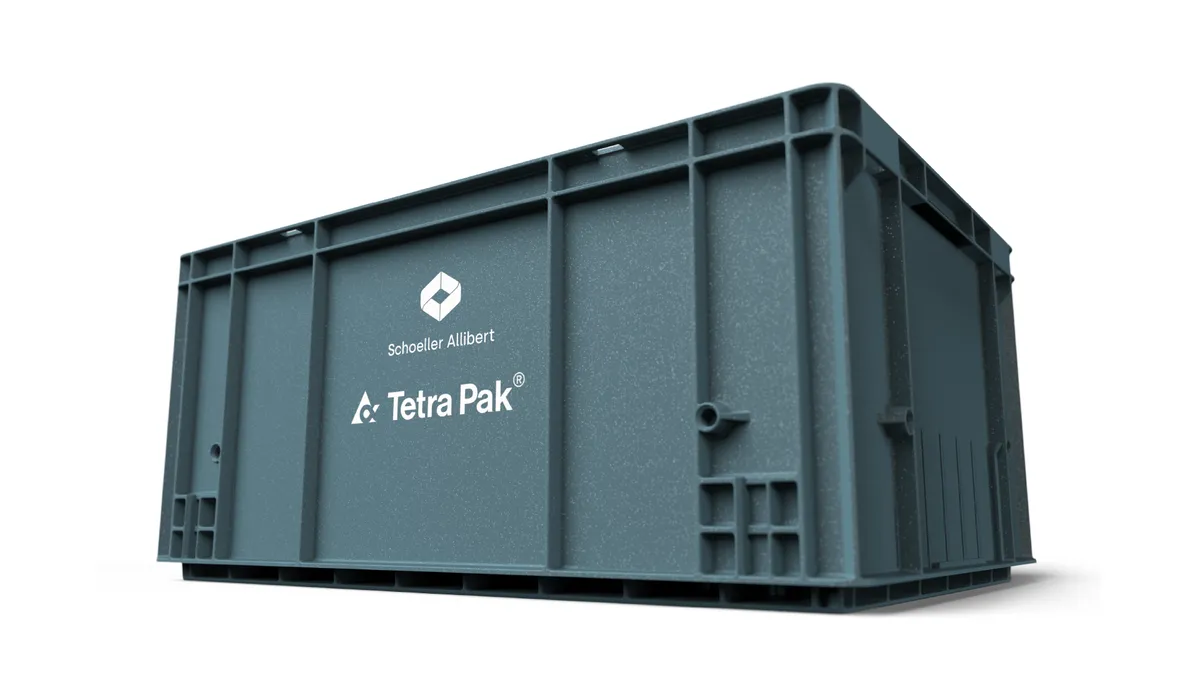Dive Brief:
- Switzerland-based Tetra Pak partnered with Netherlands-based industrial packaging company Schoeller Allibert to unveil on Monday a new transport crate made with recycled material from used beverage cartons.
- The crates contain up to 50% of a mixed polymer and aluminum material, called polyAl, from used beverage cartons and other recycling streams. Tetra Pak estimates that each crate is made from about 200 recycled beverage cartons.
- The crates are undergoing field testing. Once they are validated, Tetra Pak gradually will incorporate them into its global spare parts distribution center in Lund, Sweden, to replace over 50,000 crates it currently uses there.
Dive Insight:
PolyAl itself is a newer material recognized more widely just within the last few years, although beverage carton recycling has been occurring for decades. The ability to separate and recycle all of the materials from a carton’s multiple layers has proven challenging. Until relatively recently, only the paperboard — which comprises 70% of an aseptic beverage carton, on average — had been recovered at scale and the polyAl typically ended up in landfills or incinerators.
Tetra Pak described its increase in polyAl work in its most recent sustainability report, released last June. It says the global volume of polyAl sent for recycling in 2023 increased by 14% compared to 2022. The company works with 66 polyAl recyclers, who turn the material into pellets for use in manufacturing new plastic products. There are 38 integrated recyclers globally that can recycle both the fiber and polyAl, the report says.
Tetra Pak works with partners to develop polyAl recycling technology as well as end products that incorporate recovered polyAl. Those products include furniture and 3D printing filament. Other companies working in this space include Bausano and Plastigram Industries for polyAl processing equipment and Alier and Axjo for end markets.
Besides advancing polyAl solutions, Tetra Pak has worked to enhance its cartons’ recyclability in other ways. In 2023, for example, it partnered with Portuguese dairy company Lactogal to create an aseptic carton with a paper-based barrier that nearly eliminates the aluminum layer. That carton’s metal content is 0.05%, compared with the typical 5%.
The new crates have the potential for a lower carbon footprint than competing products due to various factors. Product reusability cuts down on the need to manufacture new products. And the incorporation of recycled materials reduces virgin material use.
In addition to product durability, Scholler Allibert touts the sustainability its reusable transport packaging can bring to supply chains. Scholler Allibert also is engaging with other partners besides Tetra Pak for polyAl logistics packaging adoption.
“This project demonstrates how advanced recycling solutions can turn waste into durable, reusable packaging that supports circular logistics and thereby the transition to a circular economy,” said Britta Wyss Bisang, vice president of sustainability and strategic marketing communications at Schoeller Allibert, in a statement. “[W]e are heavily investing in new ways to reduce the use of virgin plastic and use recycled materials such as polyAl.”
















